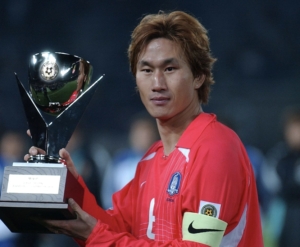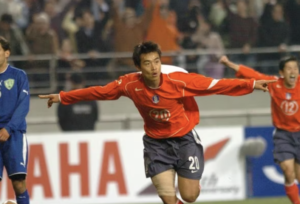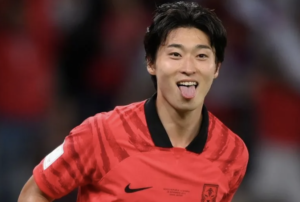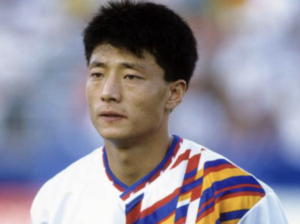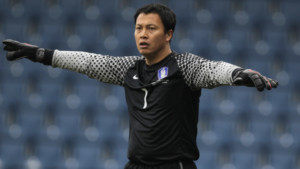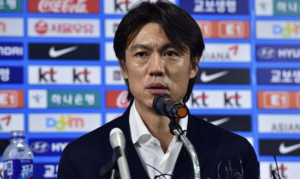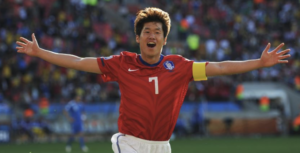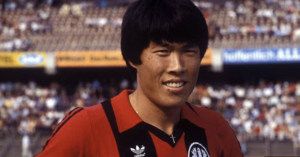Top 10 Footballers of all time in South Korea
Regarding Asian World Cup teams, South Korea is the undisputed champion. They have participated in the event more than any other team from the continent, and their run to the semi-finals while co-hosting the 2002 edition is the best performance by any Asian team.
They will remember their first participation in the finals when they were hammered 9-0 by a Ferenc Puskas-inspired Hungary before falling 7-0 to Turkey in their last group game.
They have since adapted to life on the biggest stage, and this summer’s travel to Brazil will be their eighth consecutive appearance in the competition.
-
Seol Ki-hyeon (2000-09, 83 caps, 19 goals)
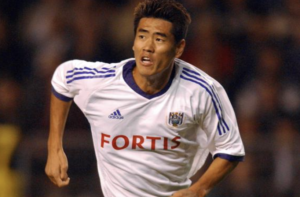
Seol Ki-hyeon is one of an increasing number of South Koreans to have played in the Premier League in recent years, having previously played for Wolverhampton Wanderers, Reading, and Fulham. Before joining Wolves, the attacker made history when he became the first South Korean to score in the Champions League while playing for Anderlecht. During his tenure in Belgium, he won a league title and scored a hat-trick in the Super Cup in just 12 minutes.
Seol was a significant player in his country’s incredible journey to the 2002 World Cup semi-finals, scoring the equalizing goal against Italy that launched Korea on their road to possibly the greatest moment in their sporting history. His performance in that tournament was so good that he was nominated for the Ballon d’Or in 2002.
-
Choi Soon-ho (1980-91, 94 caps, 30 goals)
Choi Soon-ho had few chances to shine on the international stage because he spent most of his club career in his own country. Yet, when such opportunities arose, he made the most of them. Choi finished the AFC Asian Cup as the competition’s top scorer with seven goals at 18, becoming the competition’s youngest player to do so. His best performance, though, came at the 1986 World Cup, when he scored a spectacular goal against defending champions Italy. He played for the national team in 94 matches and scored 30 goals, including a spectacular stretch in 1985 when he scored seven goals in only 12 games. Domestically, he won two K-League championships and finished as a runner-up three times.
-
Lee Dong-gook (1998-present, 99 caps, 30 goals)
If Lee Dong-gook had reached his full potential, he could have posed a threat to the top of this list. Fans dubbed Lee the ‘Lazy Genius’ because they believed his work rate did not match his skill. He was controversially left out of Guus Hiddink’s 2002 World Cup team despite having played four years previously, finishing as the top scorer in the 2000 AFC Asian Cup. His erratic international career continued when he missed the 2006 World Cup due to injury after being barred from the team for a year between 2007 and 2008. In 2010, he made his second appearance in the finals but was no longer a starter.
Throughout his club career, he played for Werder Bremen and Middlesbrough, although he had the most success in his birthplace. He won two K-League titles and the Asian Club Championship while there and was awarded league MVP twice.
-
Kim Joo-sung (1985-96, 77 caps, 14 goals)
Kim Joo-sung, another player who spent time in Germany during his club career, spent two seasons with Bochum before returning to Daewoo Royals in Korea. Kim, a versatile player who could play up front, midfield, or defense, appeared 77 times for the national team during his 11-year career. Kim played in three World Cup tournaments and the 1988 Summer Olympics for 11 years. He was primarily recognized as the best Asian player in international football at the time, and as a result, he won the Asian Footballer of the Year title three times in a row between 1989 and 1991.
He won the K-League MVP award twice and was awarded the best player in the Asian Cup and Dynasty Cup in 1988 and 1990, respectively. He was ranked the second-best Asian footballer of the twentieth century by the International Football Federation of History and Statistics (IFFHS).
-
Hwang Sun-Hongh(1988-2002, 103 caps, 50 goals)
Hwang Sun-hong was in his mid-30s when the 2002 World Cup began, but he was still an integral component of the team that advanced to the semi-finals. Indeed, he scored their first tournament goal, propelling them to their first World Cup victory. With his hit, he became one of the rare players to reach a half-century of international goals, and his ratio of about one every two games is highly noteworthy. His most memorable goal came during the 1994 World Cup when he scored against reigning champions Germany.
During the 2001 Confederations Cup, he scored against Mexico and Australia, finishing as the competition’s joint-top scorer. He appeared in three World Cup competitions, missing the 1998 event due to injury.
-
Lee Young-pyo (1999-2011, 127 caps, five goals)
Tottenham Hotspur supporters will recall Lee Young-pyo from his three-year stay at White Hart Lane, where he won the League Cup and made nearly 100 games. While in England, he was courted by Roma but ultimately chose to join Borussia Dortmund in 2008. Lee had previously won two league titles and a KNVB Cup with PSV under Guus Hiddink, who had also taken the left-back to the 2002 World Cup. In that competition, he stood out as Korea advanced to the semi-finals in front of its home fans.
He earned 127 appearances for the national team, making him the third-most capped player in South Korean history, before retiring last year after a brief time with the Vancouver Whitecaps.
-
Lee Woon-jae (1994-2010, 132 caps, no goals)
Lee Woon-jae, a player primarily recognized as Korea’s finest goalie, is one place above Lee Young-pyo on the all-time appearance list. Hong Myung-bo only surpasses his 132 caps, and he played in four World Cups, making him one of only seven Asian players to do so. He played in 1994, 2006, and 2010 tournaments, but his best performance came in 2002 when he helped Korea reach the semi-finals. Lee would play a pivotal role in the quarterfinals, stopping Joaquin’s penalty in the shootout against Spain to assist his team in achieving history by reaching the final four.
Lee won four K-League titles at the club level, six cups, and the 2001-02 AFC Champions League with Suwon Bluewings. In 2008, he was voted league MVP, and a year later, he earned the Korean FA Cup’s equivalent accolade.
-
Hong Myung-bo (1990-2002, 136 caps, ten goals)
While South Korea’s remarkable run to the World Cup semi-finals in 2002 featured many heroic performances, no player was more impressive for the Reds than skipper Hong Myung-bo. The center-talents back earned him a spot on the All-Star Team and the Bronze Ball for the tournament’s third-best player, trailing only Oliver Kahn and Cristiano Ronaldo. Before the ball was even kicked in 2002, Hong had made history by becoming the first Asian player to participate in four consecutive World Cups. He also made a significant contribution in 1994, hitting one goal and assisting another to enable his team to mount a spectacular comeback to tie 2-2 with Spain before scoring one and setting up another in a close 3-2 defeat to defending champions Germany.
Hong, the most-capped player in South Korean history, was also the only guy from his country to be named to FIFA’s 100 – Pele’s selection of the top 125 living players in 2004. Hong, the current manager of the national team, will fly to a World Cup this summer in the hopes of leading his team to another historic performance.
-
Park Ji-sung (2000-2011, 100 caps, 13 goals)
Park Ji-sung is the most well-known name on this list to the majority of fans, having achieved more club success than any other South Korean has. During his seven-year spell with Manchester United, he made over 200 appearances under Sir Alex Ferguson. He won four Premier League titles, three League Cups, and the Champions League during his stint at Old Trafford, becoming the first Asian player to do it. With PSV Eindhoven, he also won two Eredivisie titles and a KNVB Cup, making him the most decorated Asian player ever.
His best international performance came in the 2002 World Cup when he scored a game-winning goal against Portugal to advance Korea to the knockout rounds. He also scored in the 2006 and 2010 World Cups, making him the first Asian player to do it in three consecutive World Cups.
-
Cha Bum-kun (1972-1986, 121 caps, 55 goals)
It was evident from the start that Cha Bum-kun would be a remarkable player for Korea. When he made his national team debut in 1972, he was still in his teens, making him the youngest player ever to do so. He went on to win 121 caps and score 55 goals, ranking first in Korea’s scoring rankings. He also played in the 1986 World Cup, even though his fearsome reputation as a lethal attacker preceded him, and two players frequently trailed him to limit his influence on matches.
He had the most impact at the club level. Upon his move to the Bundesliga, he soon established himself as one of Europe’s greatest strikers, earning the nickname ‘Cha Boom’ for his powerful shot. Cha scored 98 goals in 308 appearances during a 10-year tenure in Germany, winning two UEFA Cups and the DFB-Pokal. Individually, he was considered the greatest Asian footballer of the twentieth century by the IFFHS.
Football column by mark
- Cristian Ronaldo success story and achievements January 30, 2024
- Top 10 Footballers of all time in South Korea March 10, 2023
- The Top 20 Future Big Stars of Football World February 22, 2023
- Top 10 Best Football Teams in the History February 22, 2023
- Who are the biggest stars at World Cup 2022? August 4, 2022
- Who are the best players not at the Qatar 2022 World Cup? August 4, 2022
- Top 10 Best Strikers In The World August 3, 2022
- Which player has more Golden Ball? August 3, 2022
- Who are the golden ball winners in FIFA Club World Cup? August 3, 2022
- Premier League youngsters To Look Out For in the 2022/2023 Season August 3, 2022
